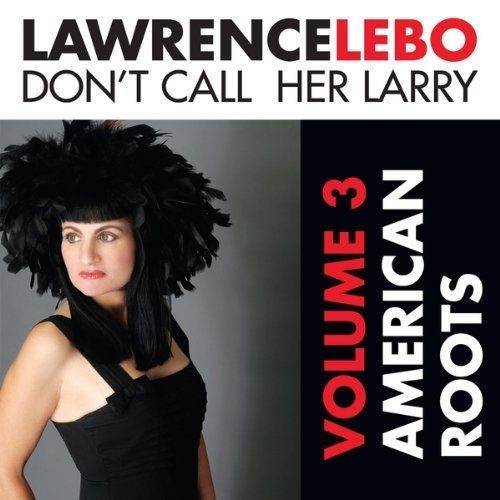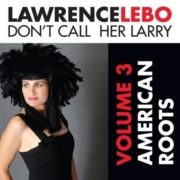LAWRENCE LEBO -DON’T CALL HER LARRY
ARTIST: LAWRENCE LEBO
TITLE: DON’T CALL HER LARRY, VOLUME 3: AMERICAN ROOTS
LABEL: ON THE AIR RECORDS
RELEASE DATE: 2010
 Hard to define, eclectic, versatile… are the frequent descriptions Lawrence Lebo has received during and after her three volume set of releases, American Roots, which has now been fully realized with the release of last year’s final recording in the series. That’s she not he, hence the Don’t Call Her Larry proclamation and album sub-title.
Hard to define, eclectic, versatile… are the frequent descriptions Lawrence Lebo has received during and after her three volume set of releases, American Roots, which has now been fully realized with the release of last year’s final recording in the series. That’s she not he, hence the Don’t Call Her Larry proclamation and album sub-title.
After exploring Big Band blues of the 1930s and 1940s in volume 1 and then displaying her songwriting and arranging skills via the live album in volume 2, in the concluding recording, that versatility is reconfirmed in a simple yet elegant setting with Ms. Lebo accompanied, for the most part, by bassist Denny Croy (Doug MacLeod, Brian Setzer Orchestra). This is song production de-constructed and built back up for the sake of the singer and the song, i.e., it’s not about Spector’s Wall of Sound.
Each song may have a special guest musician sitting in, such as the likes of accordionist, Phil Parlapiano (Lowen and Navarro, John Prine) and co-producer/mixer, Rick Cunha on lap steel guitar. Piano, saxophone, vibes, and guitar appear irregularly, but add tasteful nuance to Lebo and Croy playing up front.
The jazz phrasing and sophistication permeate the entire recording. Her attention to vocal technique adds a smart elegance to every track and the jazz and blues cuts (all songs being color-coded for you or your deejay’s quick and easy categorization) such as the opening, On Time and Was That Love have a sheen and luster that never fade. The two songs designated as western swing are in fact at two ends of that particular genre. Cunha’s lap steel puts the sting and snap into Cowboy Swinging Boogie Woogie and “A Promise That I Can Keep” is a lilting lullabye, more a dark corner swaying slow dance or moody west coast swing than a swing way-out west. But both offer different examples of that emotive vocal prowess that Lebo can swing to and fro.
Rose, Rose, a tribute to Lebo’s late canine companion combines the lyrical pathos with her plaintive vocal chorus underscoring the poignant and compelling story within the music.
She stretches it out and and sustains those “worried” notes in Walking the Back Street as Parlapiano’s accordion echoes thru the alley and Croy walks the bass lines up and down that street. A peppier blues cut is It’s Not the First Time with Cory soloing behind Lebo’s testifyin’ about cheatin’ relativity.
Six of the nine tracks are written or co-written by Lebo. One exception is the Sammy Cahn tune, I Should Care, a classic which is caressed with the right amount of sorrow and pity for that tale of woe. Lebo’s interpretation elicits the emotional melancholy via her passionate and soulful confessional vocals. She carries the torch and the tune in good form.
If you are a lover of singing as art, then you should “care” about this recording. And if you want to dive into some new and original work that adds to the great American Songbook, look no further.
Lawrence Lebo plays at McCabe's Guitar Shop on Friday, February 18, 2011. $17.50 with Doug MacLeod, 8pm
Joel Okida is a struggling artist, struggling writer, and struggling musician. It occurs to him that life is all about the struggle. Fortunately, he did not take up acting. However, he's not half-bad as a zydeco dancer and the ability to make a mean gumbo and lovely walnut tortes has gotten him by.













